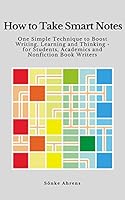How to take smart notes
- The case for taking notes
- The case for elaboration
- The case for linking notes
- Writing system
- References

Author: Sönke Ahrens
The case for taking notes
Writing is a form of learning and thinking. When we write we find holes in our own explanations, we crystallise our thought process and we learn on the topic we write about.
When we write about a topic we think we understand, we might discover that we actually don’t know about it in great detail. This will lead us to drill on the topic and eventually learn more.
But not every kind of writing is effective. Just copying something from a source and noting it down, is a wasteful effort. Instead the best form of note taking is when we elaborate on a topic in our own words.
The case for elaboration
Elaboration is a demanding task but a powerful technique. When we elaborate on a topic, it requires a lot of thought process and reflection. But we have to remember that this is a long term game. Elaborate often and regularly and soon enough we’ll make it a habit.
The case for linking notes
Whenever we want to write something new, think about which context/topic does it fall into. It will help us make connection to our already existing notes.
Don’t think about top down organization i.e. we don’t have to organize our notes into specific folders and category. We just need to link them and make them easy to discover. Once we have attained a critical mass, this kind of organization (bottom up) will be really helpful in discovering patterns in our notes. We will see opportunities for expanding our knowledge in certain areas and we’ll find our knowledge lacking in others.
But don’t become an archivist (who just jots down notes and indexes them)
The archivist asks: Which keyword is the most fitting? A writer asks: In which circumstances will I want to stumble upon this note, even if I forget about it? It is a crucial difference.
Also, whenever we want to link our notes, keep this in mind:
We learn something not only when we connect it to prior knowledge and try to understand its broader implications (elaboration), but also when we try to retrieve it at different times (spacing) in different contexts (variation), ideally with the help of chance (contextual interference) and with a deliberate effort (retrieval).
Writing system
I currently follow How I take notes. But the book recommends another and much simpler way called as zettelkasten method.
Literature notes
- They are our reference notes where we capture verbatim quotes and references
- Mostly linked to a source (like a book or a podcast)
Permanent notes
- Review our literature notes once in a while and elaborate on important topics in your own words.
- A single permanent note should be about one topic
- Once we have written out permanent note, link it to an existing note based on the context